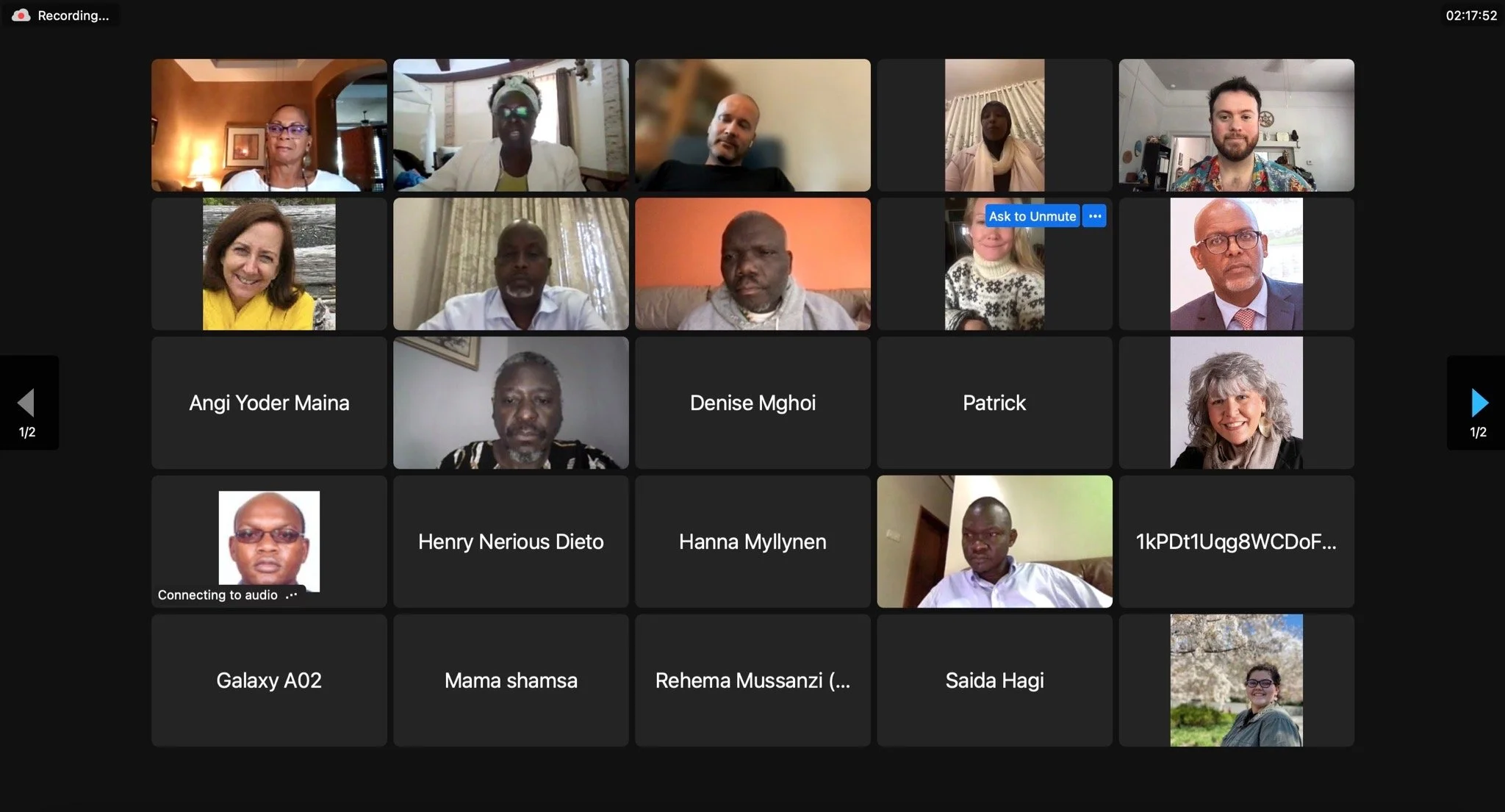Prepared by: Merisa K. Mattix & Nicholas R. Sherwood
Screenshot of webinar participants
Mandeeq Mental Health, led by Rowda Olad and Cherie Bridges-Patrick, along with Dr. Tecla Namachanja Wanjala, and their partners (Think Peace Learning and Support Hub and the Mary Hoch Center for Reconciliation), held a Virtual Regional Hub meeting on Wednesday, August 31st, 2022 from 16:00 to 18:00 East Africa Time. As part of a larger initiative being conducted with the Helsinki Deaconess Foundation, this program brought together peacebuilders from Kenya, Somalia, Uganda, DR Congo, Sudan, South Sudan, and globally to speak about the intersections of trauma-healing, mental health and psychosocial support (MHPSS), and social healing with their peacebuilding work.
The key objectives for the discussion specifically were to (a) advance trauma healing as a critical component in post-conflict reconstruction, truth & reconciliation processes, and peacebuilding efforts, (b) build relationships and strengthen networking and collaboration among practitioners in the Horn of Africa, and (c) share knowledge and experiences and create learning opportunities on the relationship between trauma healing and peacebuilding. The event featured six presenters who shared their essential ideas on these themes.
The keynote speaker, Dr. Babu Ayindo, presented “Healers 2.0: Revitalizing Ma’at in the Context of Kenya’s Electoral Politics”. In this presentation, he recited a poem about the seven fundamental virtues leading toward human excellence (truth, justice, compassion, harmony, balance, reciprocity, and order). These prompted thinking about different principles of peacemaking as other presenters continued.
We then heard from Dr. Angi Yoder Maina on “The Importance of Peacebuilders Holding Space for those Who Have Hurt Others.” The main points centered on the importance of including all sides in peacebuilding processes and not excluding perpetrators or witnesses who must heal from traumatized systems.
Dr. Tecla Namachanja Wanjala complemented these speakers with her work and her establishment of her role between peacebuilder, counselor, etc. in her presentation “Decompartmentalization the Peacebuilding Processes: Towards a Holistic and Integrated Approach to Peace.”
In his presentation “What policy issues pose threats or create barriers to trauma healing, truth and reconciliation processes, and peacebuilding efforts?”, Jama Egal brings up important points about the systemic violence many faces. He asks how truth-telling and reconciliation practices, combined with trauma healing, can break the cycles of violence seen now.
Following Jama, Osman Moallim spoke about “Behavior Change through Social Healing” and the local and cultural practices that can gently expose ‘unseen emotions’ that drive behavior after traumatic experiences.
Finishing the presentations before the group discussion, Alfred Kibunia spoke about the health of peacebuilders in his “Self-Care in the Context of Social Healing and Peacebuilding.” He explains that he has seen many peacebuilders who carry the weight of the people they are helping and wants to see practitioners resting and celebrating through their work.
Although there was limited time for small group discussions, we found participants could gather some critical insights in conversation. Participants shared insights about their work and how they saw trauma healing and psychosocial support in the large group.
In the next few months, the organizers will also hold a World Mental Health Day event in Mogadishu on October 10th with Mandeeq Mental Health, as well as a private co-creation event in Nairobi in early November with the Shalom Center for Counseling and Development. This initiative aims to create more dialogue and better practices to address mental health and psychosocial support through peacebuilding practices in Eastern Africa.

